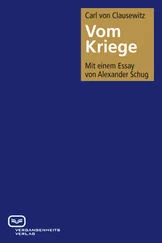This is, therefore, an opinion formed through the connection of events, and therefore through the RESULT. But there is another quite different effect of the result itself upon the judgment, that is if it is used quite alone as an example for or against the soundness of a measure. This may be called JUDGMENT ACCORDING TO THE RESULT. Such a judgment appears at first sight inadmissible, and yet it is not.
When Buonaparte marched to Moscow in 1812, all depended upon whether the taking of the capital, and the events which preceded the capture, would force the Emperor Alexander to make peace, as he had been compelled to do after the battle of Friedland in 1807, and the Emperor Francis in 1805 and 1809 after Austerlitz and Wagram; for if Buonaparte did not obtain a peace at Moscow, there was no alternative but to return—that is, there was nothing for him but a strategic defeat. We shall leave out of the question what he did to get to Moscow, and whether in his advance he did not miss many opportunities of bringing the Emperor Alexander to peace; we shall also exclude all consideration of the disastrous circumstances which attended his retreat, and which perhaps had their origin in the general conduct of the campaign. Still the question remains the same, for however much more brilliant the course of the campaign up to Moscow might have been, still there was always an uncertainty whether the Emperor Alexander would be intimidated into making peace; and then, even if a retreat did not contain in itself the seeds of such disasters as did in fact occur, still it could never be anything else than a great strategic defeat. If the Emperor Alexander agreed to a peace which was disadvantageous to him, the campaign of 1812 would have ranked with those of Austerlitz, Friedland, and Wagram. But these campaigns also, if they had not led to peace, would in all probability have ended in similar catastrophes. Whatever, therefore, of genius, skill, and energy the Conqueror of the World applied to the task, this last question addressed to fate 11remained always the same. Shall we then discard the campaigns of 1805, 1807, 1809, and say on account of the campaign of 1812 that they were acts of imprudence; that the results were against the nature of things, and that in 1812 strategic justice at last found vent for itself in opposition to blind chance? That would be an unwarrantable conclusion, a most arbitrary judgment, a case only half proved, because no human, eye can trace the thread of the necessary connection of events up to the determination of the conquered Princes.
Still less can we say the campaign of 1812 merited the same success as the others, and that the reason why it turned out otherwise lies in something unnatural, for we cannot regard the firmness of Alexander as something unpredictable.
What can be more natural than to say that in the years 1805, 1807, 1809, Buonaparte judged his opponents correctly, and that in 1812 he erred in that point? On the former occasions, therefore, he was right, in the latter wrong, and in both cases we judge by the result .
All action in War, as we have already said, is directed on probable, not on certain, results. Whatever is wanting in certainty must always be left to fate, or chance, call it which you will. We may demand that what is so left should be as little as possible, but only in relation to the particular case—that is, as little as is possible in this one case, but not that the case in which the least is left to chance is always to be preferred. That would be an enormous error, as follows from all our theoretical views. There are cases in which the greatest daring is the greatest wisdom.
Now in everything which is left to chance by the chief actor, his personal merit, and therefore his responsibility as well, seems to be completely set aside; nevertheless we cannot suppress an inward feeling of satisfaction whenever expectation realises itself, and if it disappoints us our mind is dissatisfied; and more than this of right and wrong should not be meant by the judgment which we form from the mere result, or rather that we find there.
Nevertheless, it cannot be denied that the satisfaction which our mind experiences at success, the pain caused by failure, proceed from a sort of mysterious feeling; we suppose between that success ascribed to good fortune and the genius of the chief a fine connecting thread, invisible to the mind’s eye, and the supposition gives pleasure. What tends to confirm this idea is that our sympathy increases, becomes more decided, if the successes and defeats of the principal actor are often repeated. Thus it becomes intelligible how good luck in War assumes a much nobler nature than good luck at play. In general, when a fortunate warrior does not otherwise lessen our interest in his behalf, we have a pleasure in accompanying him in his career.
Criticism, therefore, after having weighed all that comes within the sphere of human reason and conviction, will let the result speak for that part where the deep mysterious relations are not disclosed in any visible form, and will protect this silent sentence of a higher authority from the noise of crude opinions on the one hand, while on the other it prevents the gross abuse which might be made of this last tribunal.
This verdict of the result must therefore always bring forth that which human sagacity cannot discover; and it will be chiefly as regards the intellectual powers and operations that it will be called into requisition, partly because they can be estimated with the least certainty, partly because their close connection with the will is favourable to their exercising over it an important influence. When fear or bravery precipitates the decision, there is nothing objective intervening between them for our consideration, and consequently nothing by which sagacity and calculation might have met the probable result.
We must now be allowed to make a few observations on the instrument of criticism, that is, the language which it uses, because that is to a certain extent connected with the action in War; for the critical examination is nothing more than the deliberation which should precede action in War. We therefore think it very essential that the language used in criticism should have the same character as that which deliberation in War must have, for otherwise it would cease to be practical, and criticism could gain no admittance in actual life.
We have said in our observations on the theory of the conduct of War that it should educate the mind of the Commander for War, or that its teaching should guide his education; also that it is not intended to furnish him with positive doctrines and systems which he can use like mental appliances. But if the construction of scientific formulae is never required, or even allowable, in War to aid the decision on the case presented, if truth does not appear there in a systematic shape, if it is not found in an indirect way, but directly by the natural perception of the mind, then it must be the same also in a critical review.
It is true as we have seen that, wherever complete demonstration of the nature of things would be too tedious, criticism must support itself on those truths which theory has established on the point. But, just as in War the actor obeys these theoretical truths rather because his mind is imbued with them than because he regards them as objective inflexible laws, so criticism must also make use of them, not as an external law or an algebraic formula, of which fresh proof is not required each time they are applied, but it must always throw a light on this proof itself, leaving only to theory the more minute and circumstantial proof. Thus it avoids a mysterious, unintelligible phraseology, and makes its progress in plain language, that is, with a clear and always visible chain of ideas.
Certainly this cannot always be completely attained, but it must always be the aim in critical expositions. Such expositions must use complicated forms of science as sparingly as possible, and never resort to the construction of scientific aids as of a truth apparatus of its own, but always be guided by the natural and unbiassed impressions of the mind.
Читать дальше












